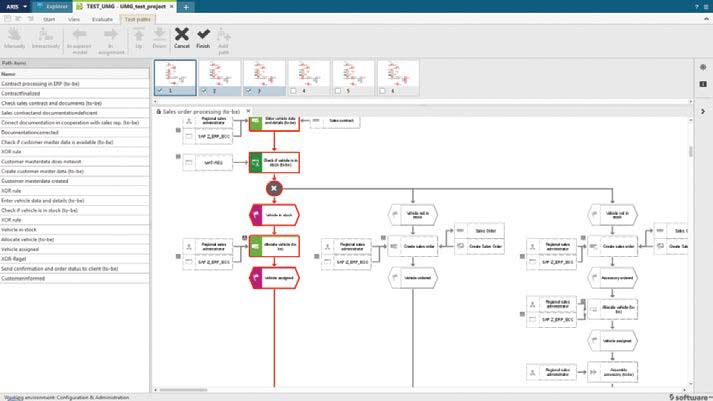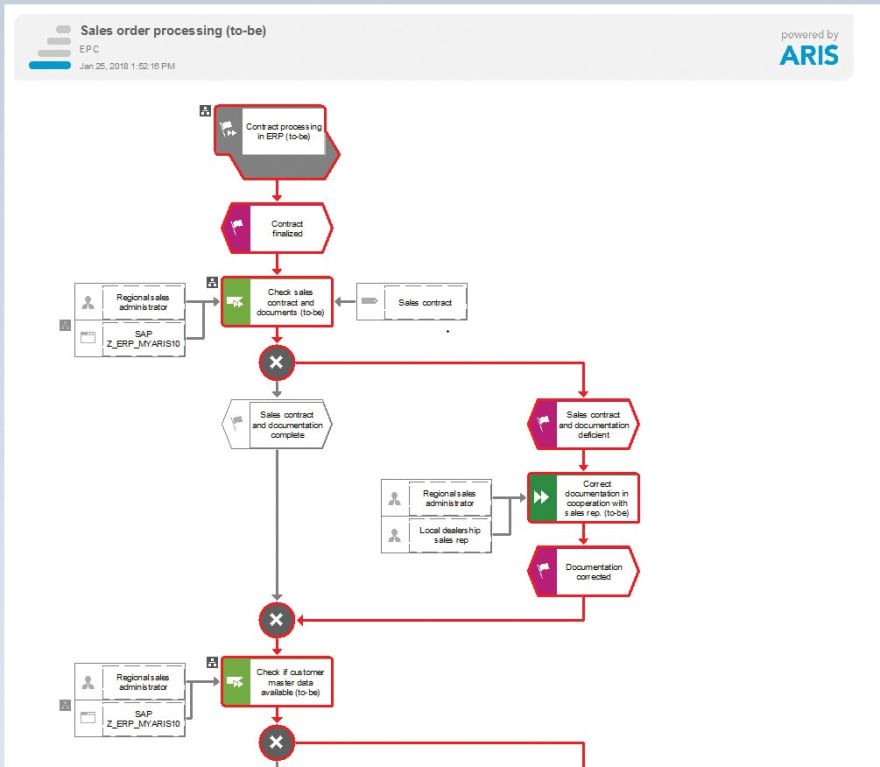How to Secure Excellence with ARIS Test Designer
Looking at the main reasons why IT and transformation fail, we see testing is a main pain point. It shouldn’t be. You've got everything in your hands to drive success thanks to process–driven testing.
| Issue 2, 2018 |  Download PDF Download PDF |
|---|
I’ve got 99 problems but testing ain’t one—are you sure?
A majority of companies, or better said project managers, are concerned about the risks related to testing. Indeed, the complexity of testing and its “time budget” in the project schedules are often underestimated. Furthermore, bad test coverage leads to incomplete testing with bad influence on VIPs (Very Important Processes). But being concerned is obviously not enough as we still have a lack of consideration for testing. Let’s have a quick look at some areas:
- Planning of testing phase – often inadequate and postponed within the project plan for so–called important activities. Dedicated test plans are rare and mostly one point in a row of many other project activities.
- Testing commitment & acceptance – project teams and managers often see testing as proof that everything is going fine rather than as a chance to find out issues. Even testing needs management commitment to support efforts and fulfill the right expectations. As a matter of fact, end–user acceptance for testing and test results are often missing.
- Testing management challenges – availability of adequate test resources, from a technical or organizational perspective, is often missing. Unclear testing responsibilities, missing expertise, inadequate test documentation and communication are common testing management failures.
- Business requirements testing problems – if requirements and processes are not clear, testing won’t make it any better and can’t show what’s going wrong and what needs to be improved.
Thus, lack of comprehensive testing and risks that come along with bad testing are immense. This may lead to failed transformation, unsuitable application configuration, lack of quality end–to–end processes, postponed or even failed go–live and in the end to ineffective end users, bad acceptance of the new processes and unhappy customers. All of these issues will cost a lot: You'll lose time (which is money) in the project and while business is running, operations and system quality will suffer, which will lead to unsatisfied customers who may turn their backs on your company.
IS THAT WHAT YOU WANT?
Surely not! Now let’s see it from the positive side. Bad testing is bad for your business but good testing benefits are much higher than bad testing costs – so let’s go ;–) The solution is process– driven testing. Not kidding. Process–driven testing makes sure your VIP processes run the way they should. This secures high– quality processes and smoothly working applications, which in return lead to happy and loyal customers. In fact, it supports your successful transformation. And you won’t believe it but taking your time for end–to–end process testing will save you time. Testing will help you consider the right processes and unveil issues early enough to solve them.
Process–oriented test design ensures processes work the way they should
ARIS Test Designer enables process–oriented testing so that you can rely on fast, easy and comprehensive test design. How? ARIS Test Designer gives your end "power" users the chance to design tests by themselves in taking the blueprint – process – information and reusing it to create the different tests.
Let’s have a detailed look on how it works. ARIS Test Designer supports:
- Easy, fast and flexible end–to–end test path recording
- Intuitive capturing of multiple test variants
- Automatic creation of test documents
- Export to standard testing applications and synchronization with SAP® Solution Manager
Easy, fast and flexible end–to–end test path recording
The test team, commonly the power or end users, will go in ARIS and create a test project. Here, they can select the processes that should be tested and, via drag–and–drop, assign those to the test project. It’s the first step to design the scope of the tests. They can then select a process and based on a “recording” mode go through the process and select the path to be tested.
When a process is straightforward, it’s simple; but for more complicated processes, the knowledge of the business is needed. This recording mode also works on several processes so that the design of end–to–end tests scenarios (you may call them integration tests), such as order–to–cash, are supported as well. Which scenarios are important and happen again and again?
Which process exceptions are, let’s say, less important and do not need to be tested right away? All this knowledge is included in the test path design if you let your end users do it. Additionally it will increase end–user acceptance of new processes and systems as they suddenly have more influence on the business.

Fig. 1: Test Path Selection in VAD

Fig. 2: Test Path Selection in EPC
Automatic capturing of multiple test variants
Of course sometimes you will need to create comprehensive test cases and go through all possible process paths. As having two or three decisions within one business process already increases the number of possible test paths, you can imagine how many possibilities you will have in a complete business case. To help you, ARIS Test Designer offers automated or semi–automated test design. The user designing the tests can choose between several options: Either automatically create all possible test paths or generate a selection of automatically proposed test paths.

Fig. 3: Automated Test Path Generation
Automatic creation of test documents
Testers need more than just the process flow information. That’s why ARIS Test Designer automatically generates test case documents. You just run a report and select the information you want to use in your test case documents. For example, do you want to: Include the process graph or not? Add the test data so that it can be reused directly or not? Insert model description or not? Press the report button, and the test case is created and ready for use.

Fig. 4: Display of Test Path in Test Document
Export to standard testing applications and synchronize with SAP Solution Manager
Process–driven testing is important, and business information from ARIS brings great value. But ARIS is NOT a test management tool by itself. That’s why ARIS Test Designer supports the export of test cases and descriptions to standard testing applications such as standard Microsoft® applications (for smaller usage and companies) as well as leading testing tools such HP® Application Lifecycle Management (the import is available as a tech preview feature in patch 12.55p02). From there, process–based test information can be reused and managed in the test applications.
As ARIS has a dedicated interface with SAP Solution Manager, test information can be synchronized with SAP Solution Manager and then transferred to SAP® Test Workbench for test execution.
Test design in ARIS leads to excellence– nothing more, nothing less
All in all, ARIS Test Designer offers a comprehensive solution to make sure your testing leads to the excellence you aim for:
- Mitigate risks of critical system implementation by using comprehensive and high–quality testing
- Accelerate release cycle time thanks to reuse of process data and fast test conception
- Win end–user acceptance and positive experience through high–quality systems
- Save time through re–usability of previous test projects
- Even ensure compliance for specific industries, such as pharmaceuticals
For more details watch the webinar on ARIS Test Designer.






Top comments (0)